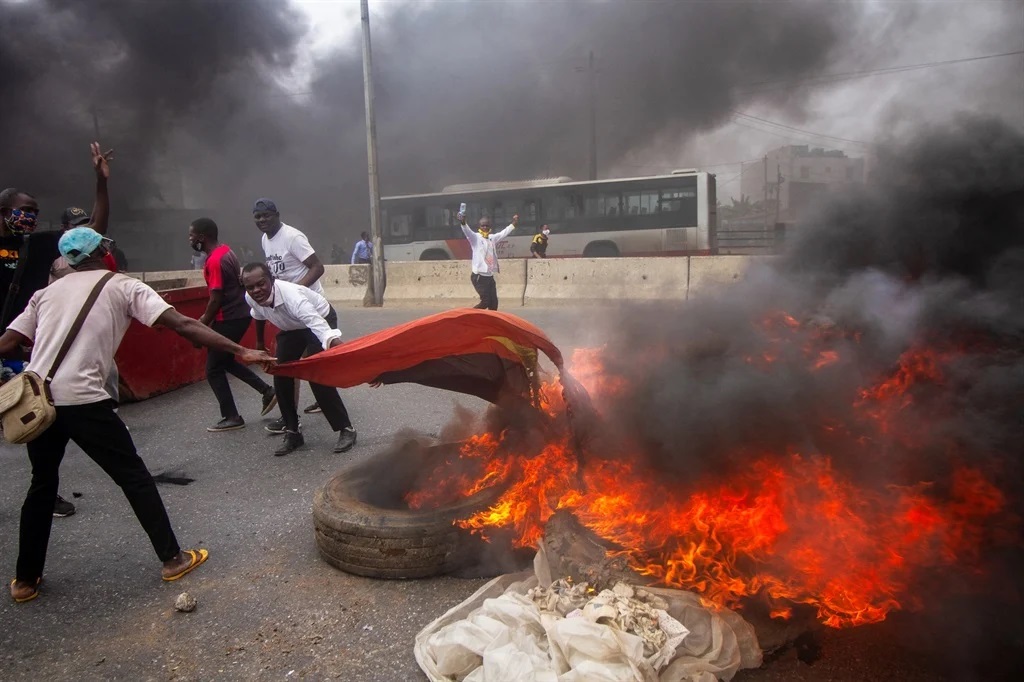Authorities in Angola on Tuesday, have confirmed that four people were killed and around 500 arrested following mass demonstrations that erupted in the capital, Luanda.
What began as a planned three-day strike by taxi operators over fuel prices quickly spiraled into widespread unrest, marking one of the most significant protests the country has experienced in recent years.
On Monday, thousands of demonstrators took to the streets, blocking major roads, looting shops, vandalizing vehicles, and engaging in violent clashes with police.
The protests continued on Tuesday, with sporadic unrest reported across Luanda, accompanied by more incidents of looting and confrontations between citizens and security forces.
According to police, efforts are underway to restore public order, and patrols have been intensified across the capital.
Law enforcement has warned that they will respond to any further disruptions in a bid to maintain peace and security.
At the heart of the unrest is a 33% increase in diesel prices implemented by the government earlier this month as part of a broader strategy to phase out fuel subsidies in the oil-rich nation.
While the government argues that fuel remains relatively affordable by international standards, the increase has had a cascading effect on everyday life.
Transportation costs have surged, pushing up the prices of food and other essential goods, worsening the economic strain for many Angolans.
“This fuel price hike is just the tipping point,” said Laura Macedo, a well-known activist in Luanda, speaking to the BBC.
“People are angry. Hunger is everywhere, and the cost of living is crushing the poor.”
Many urban residents rely heavily on shared taxis for daily transport.
As fuel prices rise, so do fares, placing an additional burden on citizens already grappling with low incomes.
The average monthly salary in Angola is roughly 70,000 kwanzas (about $75), and a presidential promise to raise it to 100,000 kwanzas has not yet been fulfilled.
President João Lourenço has downplayed the public outrage, arguing that the protests are politically motivated.
In an interview with CNN Portugal, he stated: “Even with the recent increase, diesel in Angola still costs around 40 US cents per liter.
“That’s one of the lowest prices globally. The issue here isn’t just about fuel.”
Still, the protests have laid bare deeper frustrations with the ruling MPLA party, which has governed Angola since independence in 1975.
Demonstrators voiced anger not only over the price hike but also about decades of economic mismanagement, corruption, and unfulfilled promises.
State-run media outlets have faced backlash for largely ignoring the events as they unfolded.
On social media, many criticized the lack of coverage, accusing broadcasters of avoiding topics that portray the government in a negative light.
By Monday evening, the MPLA issued a statement condemning what it described as “acts of vandalism,” urging young people to steer clear of the protests.
The party claimed that the demonstrations were orchestrated to disrupt plans for Angola’s upcoming 50th Independence Day celebrations.
Local officials in Luanda also expressed alarm.
In a public statement, they referred to the situation as a “disturbance” and blamed “unidentified individuals” for reigniting the strike after an initial agreement had reportedly been reached with taxi operators.
They claimed that these individuals were responsible for inciting violence and intimidating motorists, including those not involved in the strike.
Despite attempts at damage control, the protests appear to have taken on a life of their own.
Many of the demonstrations have been spontaneous and decentralized.
The major taxi union, ANATA, has publicly distanced itself from the violence but maintained its call for a continued strike.
“Taxi drivers are speaking on behalf of the wider population,” the group said.
As of Tuesday, most businesses, banks, and major retail outlets in Luanda remained shut.
While some public servants have returned to work, many private-sector employees were advised to stay home for safety reasons.
The government faces growing pressure to respond meaningfully to the economic grievances driving the unrest.
In the meantime, the streets of Luanda remain tense, with the police promising to act decisively to quell any further disruptions.







